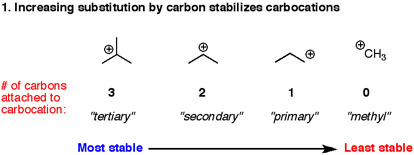- Which carbocation is more stable, the ethyl carbocation or n-propyl carbocation?
- What is the effect of alkyl group length on the stability of a carbocation?
-
1$\begingroup$ Your first question, which carbocation is more stable, ethyl or n-propyl, has already been answered (see here). $\endgroup$– ronCommented Mar 8, 2016 at 19:20
-
$\begingroup$ @ron actually i couldn't completely understand the answer (quite a high level for me).But what i found from your answer is ethyl cation is an exception right?.But i have a doubt,is it correct that only methyl group can show inductive effect (can -CH2- group show inductive effect?)?Also would you post a simple answer about the dependence on length of alkyl group. $\endgroup$– Abhishek P GCommented Mar 9, 2016 at 15:46
-
1$\begingroup$ Yes $\ce{-CH2 -}$ can show an inductive effect, all alkyl groups can. $\endgroup$– ronCommented Mar 9, 2016 at 15:52
-
$\begingroup$ @ron thanks.Would you please explain me the dependence of +i effect on length?Is there any dependency?Am I wrong about this concept? $\endgroup$– Abhishek P GCommented Mar 9, 2016 at 15:56
-
$\begingroup$ There is likely a measurable difference between methyl and ethyl due to the hyperconjugation reasons mentioned in the answer below. Beyond that I would expect very small differences (for example between n-propyl and ethyl). $\endgroup$– ronCommented Mar 9, 2016 at 16:15
1 Answer
Carbocation stability is widely known to increase going from primary -> secondary -> tertiary.
In the absence of other factors (such as lone pair donation etc.), the major contribution to the greater stability of tertiary carbocations vs primary is due to hyperconjugation between the vacant p-orbital (carbocation) and the C-H sigma bonding MO's.
Based on hyper conjugation alone, you can predict that length of the alkyl chain will have no effect on the stability by itself, only the number of neighbouring C-H bonds with which hyper conjugation can take place.
In specific regard to ethyl vs n-propyl cation, neither are considered stable.
-
$\begingroup$ Then why is there a variation in the acidity of primary aliphatic acids say between hexanoic acid and butanoic acid ?though the ka value difference is small still what is the reason for the differencce? $\endgroup$ Commented Feb 7, 2016 at 23:00


